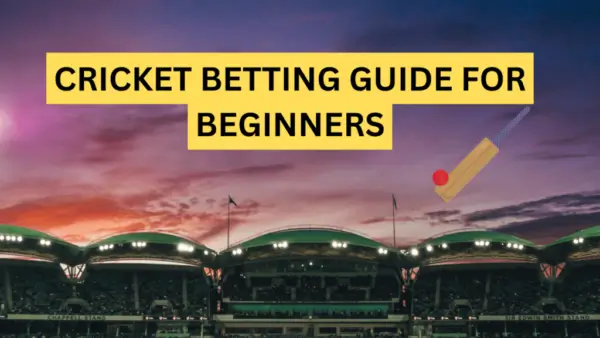Problem Gambling Prevention is an essential consideration for all bettors before engaging in the betting industry. Each betting platform incorporates a dedicated responsible gambling page to guide its users.
Do you know why?
Table of Contents
The thrill of the game, the tension of the crowd, and the victory of happiness – the world of gambling has captivated hearts and fueled empires for centuries.
But alongside the excitement, a darker side lurks the allure of addiction and the catastrophic effects of problem gambling.
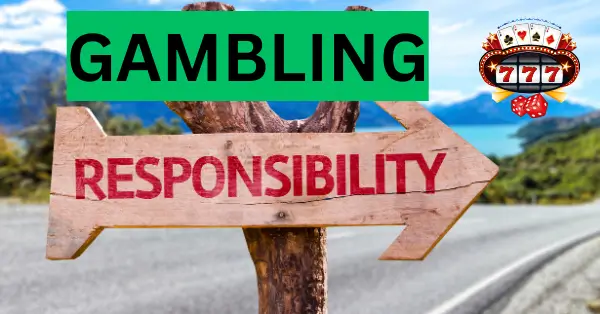
In the digital era, where online sportsbooks and casinos are just a click away, the risks are higher. Millions worldwide struggle with gambling addiction, entrapping themselves in a web of financial hardship, broken relationships, and mental health issues.
But amidst the darkness, a light of hope shines. Technology, the force that stimulated this online gambling boom, is spearheading a revolution in responsible gambling practices.
Gambling Addiction Recovery, Investment, and Treatment (GRIT) Act
In January 2024, Senator Richard Blumenthal from Connecticut and Representative Andrea Salinas from Oregon introduced the GRIT Act, focusing on the recovery, investment, and treatment of gambling addiction.
It aims to address the growing problem of gambling addiction in the U.S. by establishing the first-ever dedicated federal funding stream for prevention, treatment, and research.
This is the path-breaking step in the process of dealing with gambling addiction. The bipartisan bill is currently awaiting action in the Senate and House of Representatives. Let’s discuss the key aspects of the Act for the Problem Gambling Prevention.
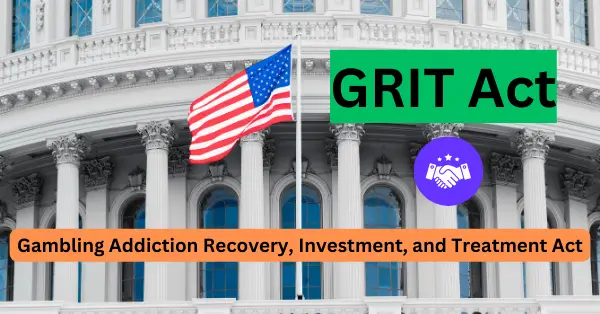
Key Points of the GRIT Act
- Funding: The GRIT Act would allocate 50% of the federal sports excise tax revenue to gambling addiction programs. This would generate an estimated $300 million annually.
- Distribution: 75% of the funds would be distributed to states through the existing Substance Abuse Prevention and Treatment Block Grant program. States would then use the money to fund gambling addiction prevention and treatment programs.
- Research: The remaining 25% of the funds would be directed to the National Institute on Drug Abuse (NIDA) to support research on gambling addiction.
- Authorization: The GRIT Act would authorize funding for 10 years.
- Reporting: The Secretary of Health and Human Services would be required to submit a report to Congress on the program’s effectiveness within three years of passage.
Potential Impact of the GRIT Act
The GRIT Act has the potential to make a significant impact on the fight against gambling addiction in the U.S. By providing dedicated funding for prevention, treatment, and research, the Act could help to:
- Increase access to evidence-based treatment for gambling addiction.
- Develop new and effective prevention strategies.
- Improve our understanding of gambling addiction and how to treat it.
- Reduce the negative social and economic costs of gambling addiction.
Based on the available data, approximately 7 million Americans wrestle with gambling addiction, leading to an annual societal expense of $7 billion.
Problem Gambling Prevention: The Grip of Gambling Addiction
Gambling addiction, also known as gambling disorder, is a recognized mental health condition characterized by a tempting urge to gamble despite the negative consequences. It’s not about winning or losing; it’s about the eagerness for the next bet.
This intense craving can lead to:
Symptoms:
- Obsessive thoughts about gambling: Constant obsession with placing bets, analyzing odds, and plotting strategies.
- Financial ruin: Risking or losing significant amounts of money, stockpiling debt, and neglecting financial responsibilities.
- Relationship strain: Gambling-related conflicts with family, friends, and partners, leading to isolation and social withdrawal.
- Mental and emotional distress: Anxiety, depression, mood swings, sleep disturbances, and even suicidal thoughts.
- Loss of control: Inability to limit gambling despite intentions or promises to stop.
The statistics paint a gloomy picture. Nearly 2% of the global population suffers from gambling disorder, with even higher rates in certain countries. In the UK, for example, 0.5% of adults gamble daily, and 2.7% gamble at least once a week. Over 75-80 percent of American adults gamble every year.
The financial costs are shocking, with billions lost annually to problem gambling. But the true toll is measured in broken families, shattered careers, and lost lives.
Beyond Compulsive Gambling
While compulsive gambling is the most commonly referred to, the umbrella of gambling addictions encompasses a wider spectrum:
- Sports betting addiction: An obsessive focus on sports wagers, often with unrealistic expectations and impulsiveness.
- Casino gambling addiction: Fixated on playing games of chance like slots, roulette, or blackjack, chasing elusive wins to escape from problems.
- Online gambling addiction: The convenience and accessibility of online platforms exacerbate the addictive tendencies, blurring the lines between play and compulsion.
Embracing Responsible Gambling Practices
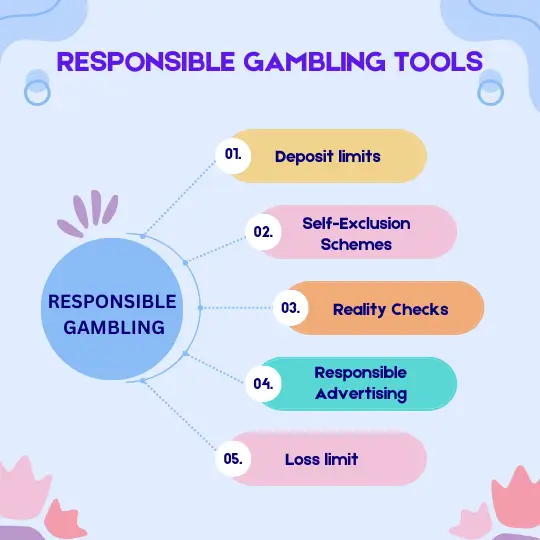
Recognizing the root of the problem, the gambling industry, regulators, and support organizations are joining forces to promote responsible gambling. This includes:
- Deposit limits: Setting personalized limits on how much you can deposit on a weekly or monthly basis helps restrain impulsive spending and regain control over the funds.
- Self-exclusion schemes: Taking a break from gambling can be life-changing. Self-exclusion programs allow users to temporarily or permanently block themselves from accessing gambling platforms. It helps to rejuvenate your mind.
- Reality checks: These timely reminders during play sessions help users stay aware of the time, money spent, and potential risks. This helps to come out of the gambling environment.
- Responsible advertising: Sensitive depiction of gambling and avoiding targeting vulnerable demographics are crucial steps to prevent normalization and glamorization of addiction.
- Loss Limit: Loss limits are a good way to keep you from chasing your losses when things don’t go well. It will be a lifesaver.
These measures, while valuable, are just the tip of the iceberg. Technology is now taking responsible gambling to the next level, offering personalized solutions and real-time solutions.
Every Betting operator in the international market is required to offer responsible gambling tools. You can view the page related to responsible gambling at the bottom of their home page.
For instance, BetMGM, a sports betting platform, is equipped with tools to make your betting more enjoyable and safe. Some of them include:
TIMEOUT: You can take a break from playing on the platform from 72 to up to one year. In this period, you won’t be able to place bets, however, you can still log in to your account.
You can also set a specific time in a day to play. You may set a limit on the total amount of funds you can deposit on a daily, weekly, and monthly basis. Once you have hit this spending/loss limit, you will no longer be able to wager until the period has expired.
Recognizing Potential Problem Gambling
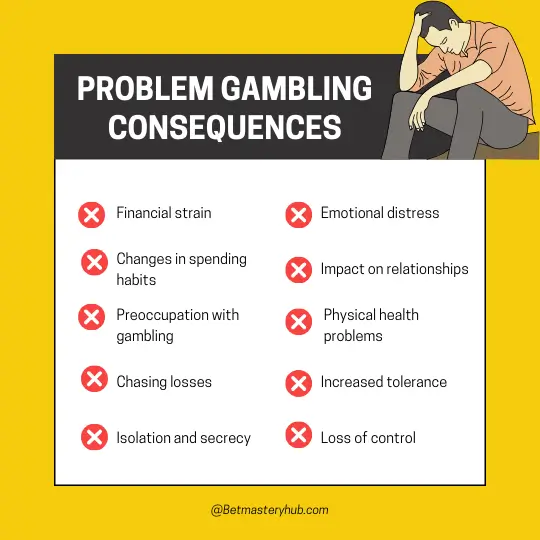
- Financial strain: Increased borrowing, difficulty in paying bills, missing rent or mortgage payments due to gambling losses.
- Changes in spending habits: Spending more than planned on gambling, hiding gambling expenses, selling personal belongings to fund gambling.
- Preoccupation with gambling: Obsessive thoughts about gambling, neglecting work or personal responsibilities due to gambling, planning the next gambling opportunity.
- Chasing losses: Trying to win back lost money by gambling more, often leads to bigger losses and deeper financial trouble.
- Isolation and secrecy: Withdrawing from social activities, lying about gambling habits, becoming irritable or defensive when questioned about gambling.
- Emotional distress: Anxiety, depression, mood swings, suicidal thoughts or actions related to gambling losses or consequences.
- Impact on relationships: Gambling causes arguments, strained relationships with family and friends, and neglecting loved ones due to gambling.
- Physical health problems: Sleep disturbances, fatigue, changes in appetite, neglecting personal hygiene due to excessive gambling.
- Increased tolerance: Needing to gamble more and more to get the same thrill or excitement.
- Loss of control: Feeling unable to stop gambling even when you want to, despite negative consequences.
It can happen to anyone. After smartphones have taken our precious time, most people including children and youth are addicted to phones. They spend most of their time on social sites like Instagram, WhatsApp, etc.
The problem is we don’t realize we are addicted or we don’t accept but it is obvious that we are obsessed. This is the same for Gambling. Problem Gambling prevention is being taken seriously by everyone to be safe and mentally calm.
Underage Gambling Concern
Underage Gambling refers to the engagement of minors in gaming and betting activities. The majority of countries prohibit gambling for individuals below a specified age, with 18 years being the prevalent minimum age restriction.
Underage Gambling is supervised with KYC, playing a vital role, and age verification checks that strengthen the procedure.
Online betting platforms display age restriction messages on the registration page along with country/state restrictions. technologies help to verify whether the players are in authorized gambling jurisdictions.
Many curious adults try to bypass age restrictions through fake IDs and using proxy servers. The process is illegal and can put your personal information at risk and land you in big trouble.
Problem Gambling Prevention Tools
Responsible gambling tools help you to improve your betting experience and protect you from falling into the black hole of addiction.
Some of the Software & Tools that help with Gambling addiction are:
- GAMESTOP: It is a UK-based free tool that assists in self-excluding all GB-licensed gambling websites in the UK.
- GAMBAN: With Gamban, you can block yourself from all the UK betting websites and track the progress of your gambling-free period. There are many other tools to support you to get rid of the addiction.
- GAMBLOCK: Gamblock blocks access to online gambling with the availability of single and multiple licenses.
- BET BLOCKER: It is a UK-registered free service. You can not only block gambling websites but also manage your gambling by restricting it whenever you want to without even registering. It also Parental Controls option, allowing you to restrict access to both gambling and other adult content when your kids are using the device.
- NETNANNY: A parental control software to monitor and protect children from harmful content. It also enhances safe browsing and managing screen time with real-time alerts. Along with gambling, it blocks other adult content. Netnanny blocks apps, and websites and sets internet filters.
Tech Takes Center Stage: The Future of Responsible Gambling
Now we are witnessing AI algorithms monitoring your gambling behavior, identifying potential signs of addiction before they spiral out of control. There are well-developed tools and algorithms to tackle gambling problems.
- AI-powered risk assessment: These sophisticated algorithms analyze user data, including betting patterns, deposit frequency, and time spent on platforms, to anticipate the risk of developing gambling problems. Early identification allows for targeted interventions and support.
- Personalized interventions: Based on individual risk profiles, users receive tailored interventions, such as pop-up messages offering resources or temporary account freezes, before they fall deeper into addiction.
- Mindfulness and self-control apps: These apps utilize gamified elements and cognitive-behavioral therapy techniques to promote responsible gambling habits and equip users with tools for managing appetites.
- Biometric authentication: Integrating facial recognition or fingerprint scanning can restrict access to gambling platforms for individuals who have self-excluded or are deemed at high risk.
A Collaborative Approach: Building a Safe Ecosystem
No single entity can dive into the challenge of problem gambling alone. Effective solutions require a collaborative approach involving:
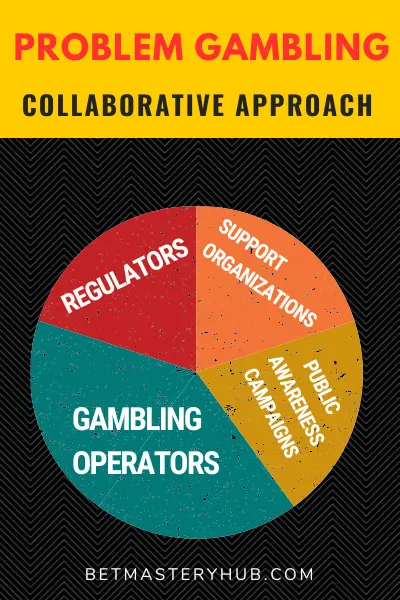
- Gambling operators: Integrating responsible gambling tools, clinging to ethical advertising best practices, and providing transparent information are essential steps for operators to take ownership.
- Regulators: Implementing more stringent regulations on advertising, licensing, and player safety measures is crucial to hold the industry liable.
- Support organizations: Providing readily available and accessible resources, support groups, and treatment options for those struggling with gambling addiction is vital for recovery.
- Public awareness campaigns: Educating the public about the risks of gambling addiction, eliminating myths, and encouraging open conversations can help debunge the issue and encourage help-seeking behavior.
Beyond the Tech: Human Connections and Personal Empowerment
While technology plays a crucial role, it’s important to remember that responsible gambling is ultimately about human harmony and empowerment.
- Training for support staff: Equipping expert customer service representatives with the skills and knowledge to identify and support at-risk players is essential.
- Peer support groups: Connecting individuals with others who comprehend their struggles can provide great aid and encouragement.
- Sharing success stories: Highlighting stories of recovery and stability can inspire hope and motivate those struggling with addiction.
Betting with Balance: A Call to Action
The fight against problem gambling is not one we can win overnight. It requires constant caution, evolving strategies, and a collective commitment to building a safer playfield for all. But with technology as our ally and human connection as our compass, we can usher in a future where the thrill of the bet coexists with the responsibility of a balanced play.
Here’s how you can be a part of this transformation:
- Become an informed player: Educate yourself about the risks of gambling and responsible gambling practices. Make use of the information and resources available online and in your community.
- Embrace the tools: Take advantage of the responsible gambling features offered by the platforms you use. Set deposit limits, activate reality checks, and consider self-exclusion if needed. Remember, these tools are there to empower you, not restrict you.
- Open the conversation: Don’t shy away from talking about gambling addiction. If you suspect someone you know is struggling, offer support and encourage them to seek help. Remember, openness and exposure are the first steps on the path to recovery.
- Support responsible operators: Choose platforms that prioritize responsible gambling and invest in player protection measures. Your choices and preferences send a powerful message to the industry.
- Demand action: Advocate for stricter regulations and increased funding for research and treatment programs. Raise your voice and hold policymakers liable for creating a safer gambling environment.
Let’s embrace technology, facilitate human connection, and build a future where responsible gambling is as important as the game. Responsible gambling should be on the priority list while entering into the betting Industry.
Online casino & Sports developers focus on solutions that reinforce and help gamblers prevent fraudulent activities and promote safe playing.
There is only one life to live; enjoying it or ruining it is in your hands
Don’t let gambling ENSLAVE you and take control of your life. Bet responsibly
Addicted to Gambling? Here are a few websites for your support:
- The National Council on Problem Gambling
- Gambling Commission (UK)
- Gamblers Anonymous
- International Center for Responsible Gambling
- European Gaming &Betting Association
Frequently Asked Questions (FAQ)
What does gambling responsibly mean?
Gambling responsibly means prioritizing fun and entertainment while minimizing potential harm. It involves setting limits on time, money, and emotions, being aware of the risks involved, and taking responsibility.
What is the goal of responsible gambling?
Responsible gambling aims to prevent gambling-related problems like addiction, financial hardship, and negative social impacts. It encourages informed choices, promotes healthy gambling habits, and protects vulnerable individuals.
What is the responsible gambling policy?
This refers to the specific guidelines and practices implemented by gambling operators, governments, or organizations to promote responsible gambling. It typically includes measures like age verification, deposit limits, self-exclusion options, and awareness campaigns.
Why is responsible gambling important?
Gambling can be a fun and harmless activity for many, but it also carries risks. Responsible gambling practices help individuals manage those risks, preventing detrimental consequences for themselves and society as a whole.
Is gambling a moral issue?
The morality of gambling is a subjective topic with diverse perspectives. Some view it as inherently harmful, while others see it as a personal choice with responsible limitations. Ultimately, individual values and cultural contexts shape views on gambling morality.
What is social responsibility in gambling?
Social responsibility in gambling extends beyond individual players. It encompasses the obligations of gambling operators, regulators, and society at large to create a safe and ethical gambling environment. This includes minimizing harm, providing support services, and promoting responsible gambling messages.
- Top 5 Crypto Gainers Today – Feb 17, 2026
- Top 5 Crypto Gainers Today – Feb 16, 2026
- Top 5 Crypto Gainers Today – Feb 15, 2026
- Top 5 Crypto Gainers Today – Feb 14, 2026
- Top 5 Crypto Gainers Today – Feb 13, 2026

Prasanth is an experienced crypto trader and writer with 5 years of expertise in blockchain technology, cryptocurrency markets, and trading strategies. He specializes in creating insightful, easy-to-understand content that helps readers stay informed about the latest trends, investment opportunities, and security best practices in the crypto space. With a deep passion for digital assets and a commitment to providing valuable, trustworthy information, Prasanth empowers both beginners and experienced traders to make informed decisions in the fast-evolving world of cryptocurrency.

